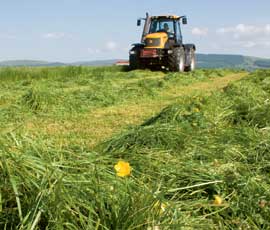Silage making key to avoiding forage shortages

Effective silage making should be high on the agenda for any beef producer looking to avoid forage shortages this coming winter.
The prospect of another dry summer followed by a further winter of high feed prices makes effective management of silage-making particularly important, says EBLEX beef and sheep scientist Liz Genever.
“While quality silage will be particularly valuable in minimising winter concentrate purchasing requirements, the experience of last season reinforces the critical need for sufficient feed stocks to last through the winter.”
The latest EBLEX BRP Manual – Making Grass Silage for Better Returns – urges producers to keep a careful eye on the adequacy of their forage stocks as the season progresses. This will allow early action to address home-grown forage shortfalls with the greatest possible economy.
“Simple assessments of fresh forage stocks can be misleading given that animal requirements depend primarily on dry matter levels,” says Dr Genever.
The manual provides typical density estimates for a range of grass, maize and whole-crop silages, allowing clamp and big bale dry matter stocks to be calculated quickly and easily. At the same time, it sets out likely dry matter intakes for a range of animal types, so winter feeding requirements can be determined and the balance between stocks and requirements effectively monitored as the forage season progresses.
Where potential winter feed shortfalls are identified early enough, EBLEX suggests a number of ways in which they may be addressed without resort to extra concentrate purchases. These include:
• Sowing a brassica crop for winter feeding
• Reducing stock numbers or out-wintering some stock
• Securing additional forage sources such as standing maize crops
• Buying in moist feeds, such as brewers’ grains
• Buying in straw for feeding with liquid feeds such as pot ale syrup or molasses;
• Buying in stock feed potatoes or food processing wastes;
• Planting a grass catch crop for early spring grazing
• Reducing waste by better managed silage feeding and;
• Ensuring the greatest mixer/feeder wagon weigh scale accuracy.
When considering additional feed purchases, the manual available free of charge to levy payers at www.eblex.org.uk or by calling 0870 2418829 – stresses the importance of assessing their value on the basis of cost a tonne of dry matter, taking full loads for the greatest economy and buying locally to keep transport costs down.
